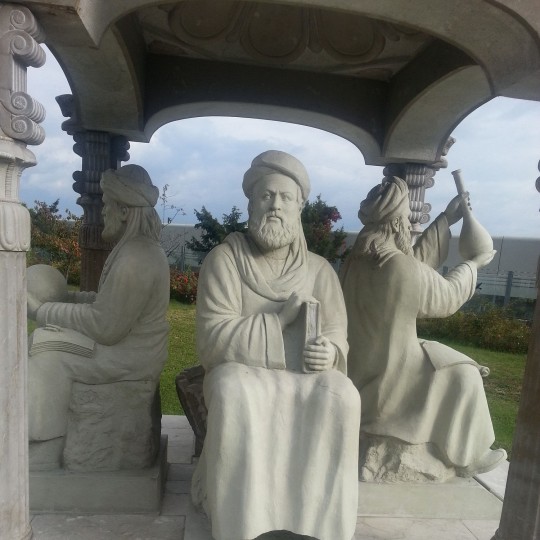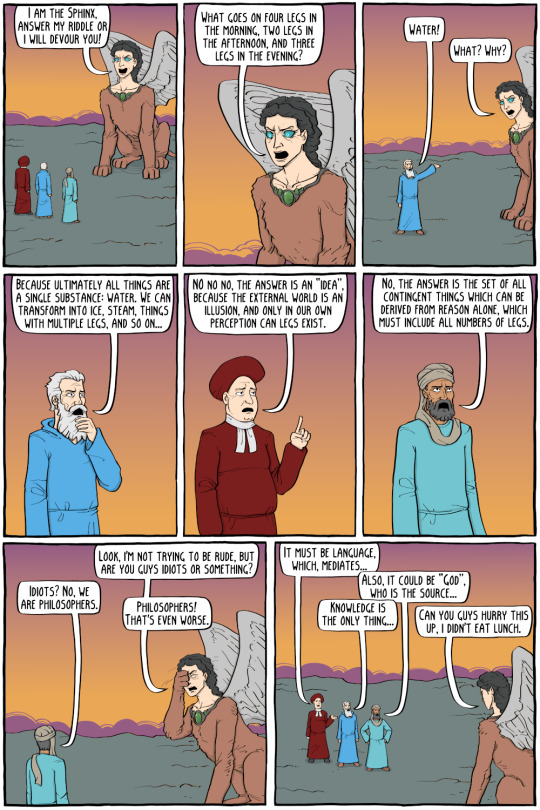#avicenna
Explore tagged Tumblr posts
Photo

Ibn Sina, Biruni, and the Lost Enlightenment
Ibn Sina and Biruni were two of the most outstanding thinkers to have lived between ancient Greece and the European Renaissance. These two giants of a lost era of enlightenment were born in Central Asia about the year 980. For six hundred years Ibn Sina's Canon of Medicine defined the field of medicine from Europe to India, while his thoughts on God and philosophy influenced Muslims, Jews, and Christians, including St. Thomas Aquinas.
Continue reading...
162 notes
·
View notes
Text
Observe your life, between two breaths. […] On this wind you have built your life— but how will a castle rest on a cloud?
— IBN SINA ⚜️ Love’s Alchemy: Poems from the Sufi Tradition, transl. by David Fideler & Sabrineh Fideler, (2010)
#Persian#إبن سينا#Ibn Sina#Avicenna#Love’s Alchemy: Poems from the Sufi Tradition#David Fideler#Sabrineh Fideler#(2010)#But how will a castle rest on a cloud?
20 notes
·
View notes
Text
Characters, book, and author names under the cut
Magnus Marston/Avicenna - Some Desperate Glory by Emily Tesh
Will Kempen/James St Clair - Dark Rise series by C.S. Pacat
Norma/Badyah - Deadendia by Hamish Steele
Lula Talisola/Zeen Mrala - Midnight Horizon by Daniel José Older
#Magnus Marston#Avicenna#Avi#Some Desperate Glory#Emily Tesh#Will Kempen#James St Clair#Anharion#Sarcean#St kempton#wames#Dark Rise#Dark Rise series#Dark Heir#C.S. Pacat#Norma#Badyah#Deadendia#Hamish Steele#Mralisola#Lula Talisola#Zeen Mrala#Midnight Horizon#starwars#Daniel José Older#lgbt books#polls#Queer Book Ship Tournament 2024
32 notes
·
View notes
Text







#Repost @poetryandgahwa
Wise Quotes from Ibn Sina…
"Ibn Sina, (also known as Avicenna) was a polymath born in 980 AD in Bukhara, present-day Uzbekistan. He made significant contributions to medicine, philosophy, astronomy, and mathematics. His most famous work, “The Canon of Medicine,” became a standard medical textbook for centuries.
Ibn Sina’s philosophical masterpiece, “The Book of Healing,” explored various topics in metaphysics and ethics. He died in 1037 AD in Hamadan, Iran, leaving a lasting legacy in the history of science and philosophy."
9 notes
·
View notes
Text

The Riddle of the Sphinx
56 notes
·
View notes
Text
LJS 426 is a copy in Arabic of Avicenna's medical encyclopedia, comprising an introduction to general knowledge of medicine, popular through the middle ages and translated and copied widely. The first 40 leaves and the last 10 are replacements.
Online:
#medieval#manuscript#arabic#medicine#history of medicine#avicenna#paper#replacement leaves#book history#rare books
73 notes
·
View notes
Text
6 notes
·
View notes
Text

4 notes
·
View notes
Text

#avi#avicenna#some desperate glory#emily tesh#avi some desperate glory#avicenna some desperate glory#hug kiss marry kill
4 notes
·
View notes
Text
Al-Rhazi and Ibn Sina kept alive and advanced much medical knowledge that had largely vanished from Europe – knowledge that had originated in Ancient Greece and Rome, and then spread through Constantinople and Gundeshapur to Baghdad and Bukhara, where it was combined with learnings from India and China, and was eventually translated back into European languages to form a basis for the flowering of the Renaissance. This reawakening of Classical thought inaugurated the age of the university, when medical schools were established throughout Europe, the Middle East, and beyond.
— Kill or Cure: An Illustrated History of Medicine (Steve Parker)
#book quotes#steve parker#kill or cure: an illustrated history of medicine#history#classics#medicine#medical history#academia#education#islamic golden age#enlightenment#renaissance#persia#iran#ancient greece#ancient rome#abu bakr al-razi#ibn sina#avicenna
18 notes
·
View notes
Text
Seeing an hour and 20 minute Let's Talk Religion video about Ibn Sina pop up in my feed has me vibrating rn.
2 notes
·
View notes
Text
The power of thoughts can cause you either illness or recovery -Ibn Sina ( Avicenna)
#inspiring#health#holistichealth#avicenna#guthealth#faraz berjis#core digestive#wellness#mindbodyconnection
3 notes
·
View notes
Text

Title: Daydreams and Pretty Lies Author:@aurorawest Fandom: Some Desperate Glory Rating: T Relationships: Avicenna/Magnus Major Archive Warnings: No Archive Warnings Apply Word Count: 2.9k Summary: Avi wants to keep making gardens for Magnus even though Magnus doesn't need him for that anymore.
Read it here!
Magnus came closer. Avi looked up at him. He was so fucking tall. Huge. To say Avi had wanted to climb him like a tree for months now was the obvious joke. Realizing you were queer and that you had a thing for men who could crush your head between their thighs was rough on Gaia. So many massive warbreed guys, so few people who didn’t want to beat him up for his sexuality. “I was looking for you, so I guess, yeah.” There was a little smile on Magnus’s face, not shy, not uncertain, exactly, but like he was holding the full force of it in reserve just in case Avi was in a mood. Which. Fuck. Avi didn’t want to be in a mood with Magnus.
4 notes
·
View notes
Text
Character, book, and author names under the cut
Daniel Jun- Radio Silence by Alice Oseman
Avicenna "Avi"- Some Desperate Glory by Emily Tesh
Hanne Brum- King of Scars duology by Leigh Bardugo
Uriel- When The Angels Left The Old Country by Sacha Lamb
#Daniel Jun#Radio Silence#Alice Oseman#Avicenna#Avi#Some Desperate Glory#Emily Tesh#Hanne Brum#King of Scars#Grishaverse#Leigh Bardugo#Uriel#When The Angels Left The Old Country#Sacha Lamb#polls#lgbt books#queer book character tournament 2
122 notes
·
View notes
Quote
Now it is established in the sciences that no knowledge is acquired save through the study of its causes and beginnings, if it has had causes and beginnings; nor completed except by knowledge of its accidents and accompanying essentials.
Avicenna
#Avicenna#quotelr#Knowledge# Study# Science# accident# beginning# cause# completion# essential# establishment# exception# saving# savings#quotes#literature#life quotes#author quotes#prose#lit#spilled ink#writers on tumblr#writing inspiration#poets on tumblr
6 notes
·
View notes
Text
I just need to shout this to the void, but what are the odds that Avicenna spoofed the strike records to incite Val into doing something that would let him escape...
3 notes
·
View notes